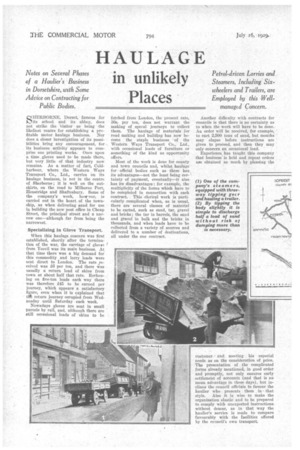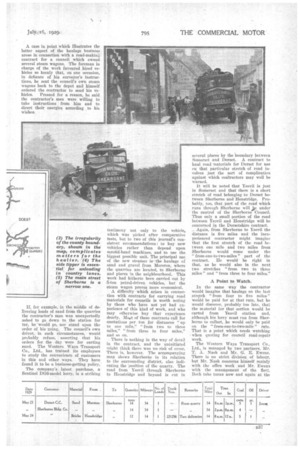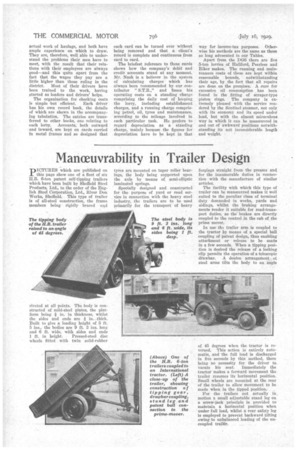HAULAGE • in unlikely Places
Page 62

Page 63

Page 64

If you've noticed an error in this article please click here to report it so we can fix it.
IFERBOENE, Dorset, famous for k,lits school and its abbey, does not strike the 'visitor as being the likeliest centre for establishing a pm. &table motor haulage business. Nor does a closer investigation of its possibilities bring any encouragement, for its business activity appears to comprise one printing works. Once upon a time gloves used to be made there, but very little of that industry now remains. As a matter of fact, Coldharbour, where the Western Ways Transport Co., Ltd., carries Our its haulage business, is not in the centre of Sherhorne ; it is well on the outskirts, on the road to Mill:tome Port, Efenstridge and Shaftesbury. Some of the company's work, bovrver, is carried out in the heart of the township, as when delivering sand for use in building the new post office in Cheap Street, the principal street and a narrow one—although far from being the narrowest.
Specializing in Clove Transport.
When this" haulage concern was first established, shortly after the termination of the war, the carriage of glovks from Yeovil was its main business. At that time there was a big demand for this commodityand lorry loads were sent direct to London. The rate _received was 18 per ton, and there was usually a return load of skins from town at about half that rate. Reckoning on five-ton loads each way there was therefore £45 to be earned per journey, which appears a satisfactory figure, even when it is explained that thlt return journey occupied from Wednesday until Saturday each week.
Nowadays gloves are sent in small parcels by rail, and, although there are still occasional loads of skins to be fetched from London, the presettt rate, 30s. per ton, does not warrant the making of specal journeys to collect them. The haulage of materials for road making and building has now become the staple business of the Western Ways Transport Co., Ltd., with occasional loads of furniture or something of the kind as opportunity offers.
Most of the work is done for county and town councils and, whilst haulage for official bodies such as these has its advantages—not the least being certainty of payment, eventually—it also has its disadvantages ; for example, the multiplicity of the forms which have to be completed in connection with each contract. This .clerical work is particularly complicated when, as is usual, there are several classes of material to be carted, such as sand, tar, gravel and bricks ; the tar in barrels, the sand and gravel in bulk and the bricks in thousands, and when loads have to be collected from a variety of sources and delivered to a number of destinations, all under the one contract. Another difficulty with contracts for councils is that there is no certainty as to when the work will have to be done. An order will be received, for example, to cart 2,500 tons of sand, but months may elapse before instructions are ' given to proceed, and then they may " only concern an occasional load.
Experience. has taught this company that business is held and repeat orders . ase obtained as much by pleasing the
customer and meeting his especial needs as on the consideration of price. The presentation of the complicated forms already mentioned, in good order and promptly, not only ensures early settlement of accounts (and that is no mean advantage in these days), but inclines the council officials to favour the haulier who presents them in that style. Also it is wise to make the organization elastic and to be p'repared to comply with unexpected instructions without demur, as in that way the haulier's service is made to compare favourably with the facilities offered by the council's own transport.
A case in point which illustrates the latter aspect of the haulage business arose in connection with a road-makiu:scontract for a council which owned several steam wagons. The foreman in charge of the work favoured hired vehicles so keenly that, on one occasion, in defiance of his surveyor's instructions, he sent the council's own steam wagons back to the depot and himself ordered the contractor to send his ve
hicles. Pressed for a reason, he said the contractor's men were willing to take instructions from him and to direct their energies according to his wishes.
If, for example, in the middle of delivering loads of sand from the quarries the contractor's man was unexpectedly asked to go down to the station for tar, he would go, nor stand upon the order of his -going. The council's own driver, in such circumstances, would probably refuse, asserting that his orders for the day were for carting sand. The Western Ways Transport Co., Ltd.. has trained its employees to study the convenience of customers in this and other ways. They have found it to be a business-getting policy.
The company's latest purchase, a Sentinel DG6-model lorry, is a striking testimony not only to the vehicle, which was picked after comparative tests, but to two of this journal's consistent recommendations: to buy new vehicles rather than depend upon second-hand machines, and to use the biggest possible unit. The principal use of the new steamer is -the haulage of sand and gravel from Moreton, where the quarries are located, to Sherborne and places in the neighbourhood. This work had hitherto been carried out by 5-ton petrol-driven vehicles, but the steam wagon proves more economical.
A difficulty which arises in connection with contracts for carrying road materials for councils is worth noting by those who have not yet had experience of this kind of work, and who may otherwise buy that experience dearly. Mt of these contracts call for auotations per ton for distances "up to one mile," "from two to three miles," "from three to four miles," and so on.
There is nothing in the way of detail in the contract, and the uninitiated might think there was no risk of error. There is, however. The accompanying map shows Sherborne in its relation to the surrounding district, also indicating the 'position of the quarry. The road from Yeovil through Sherborne to Henstridge and beyond is cut in several places by the boundary hetweeu Somerset and Dorset. A contract to haul road materials for Dorset for use on that particular stretch of road involves just the sort of complication against which contractors may well be warned.
It will be noted that Yeovil is just in Somerset and that there is a short stretch of road belonging to Dorset between Sherborne and Henstridge. Probably, too, that part of the road which runs through Sherborne will jse under the control of the Sherborne Council. Thus only a small portion of the road between Yeovil and Henstridge will be concerned in the Dorsetshire contract.
Again, from Sherborne to Yeovil the distance is five miles and the inexperienced contractor might imagine that the first stretch of the road between one mile and two miles from Sherborne would come under the " from " part of the contract. He would be right in that, as he would also in the next two stretches "from two to three miles" and " from three to four miles."
A Point to Watch.
In the same way the contractor would imagine that haulage on the last stretch "from four to five miles" would he paid for at that rate, but he would discover, probably too late, that the material for that section would be carted from Yeovil station and, although his lorry must run from Sherborne to collect, he would only be paid on the " from-one-to-two-mile " rate. That is a point which needs watching
• when quoting for council road-repair work.
The Western Ways Transport Co., Ltd., is managed by two partners, Mr. T. A. Nash and Mr. G. E. Ewens. There is no strict division of labour, but Mr. Nash concerns himself mainly with the, office work and Mr. Ewens with the management of the fleet Both take turns now and again at the actual work of haulage, and both have ample experience on which to draw. They are, therefore, well able to understand the problems their men have to meet, with the result that their relations with their employees are always good—and this quite apart from the fact that the wages they pay are a little higher than those ruling in the district. Most of their drivers have been trained to the work, having started as loadersand drivers' helps. The organization for checking costs is simple but efficient. Each driver has his own record book, the details of which are shown in the accompanying tabulation. The entries are transferred to other books, one relating to each lorry, Accounts, both outward and inward, are kept on cards carried in metal frames and so designed that each card can be turned over without being removed and that a client's record is complete and continuous from card to card.
The briefest reference to these cards shows how ihe company's debit and credit accounts stand at any moment. Alr. Nash is a believer in the system of calculating charges which has always been recommended by our contributor " S.T.R.," and bases his operating costs on a standing charge comprising the daily cost of keeping the lorry, including establishment charges, and a running charge comprising petrol, oil, tyres and maintenance, according to the mileage involved in each particular task. He prefers to regard depreciation as a standing charge, mainly because the figures for depreciation have to be kept in that
way for income-tax purposes. Otherwise his methods are the same as those so long advocated in our Tables.
Apart from the DG6 there are five 5-ton lorries of Hallford, Peerless and Riker makes. The running and maintenance costs of these are kept within reasonable bounds, notwithstanding their age, by the fact that all repairs are done on the premises. A cure for excessive oil consumption has been found in the fitting of scraper-type piston rings. The company is extremely pleased with the service rendered by the Sentinel steamer, not only with its economy and its speed under load, but with the almost miraculous way in which it can be manoeuvred in and out of awkward positions notwithstanding its not inconsiderable length and weight.




















































































































